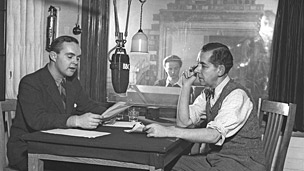70 years of Learning English BBC英語教學(xué)成立70周年

Has educational broadcasting changed since the 1940s?
Vocabulary: Educational broadcasting 詞匯: 廣播教育
收聽與下載
It only takes a few seconds of the original 1943 'English by Radio' theme tune and I'm dreaming about 1940s Britain. Crackly violin melodies build to a strong, confident finale, reassuring the listeners that we are safe in the hands of the BBC.
"Now, are you familiar with such things as prepositions?" asks a woman in a 'Queen's English' accent. "Prepositions," responds her co-presenter, "Prepositions are in a position before the noun."
He sounds like a typical old-fashioned BBC gentleman, who I imagine to be wearing a tweed suit and smoking a pipe, speaking into a square BBC 'Type A' microphone, as he illustrates: "Inside the room; outside the door; above the roof."
After a few more examples, it's time to practise. Our gentleman begins a sentence, and his co-presenter completes it. "What are you waiting... for; What are you talking... about; Which house do you live... in!" We are given some advice about using prepositions when writing, then some more practice and we finish on our theme tune once again.
It's an enjoyable and informative programme - and I begin to wonder, as a modern-day writer of ELT materials here at BBC Learning English: which elements of the early 'English by Radio' programmes are still found in today's output - and why?
Unsurprisingly, those 'Queen's English' accents have gone - and not just because 1940s BBC presenters are hard to find nowadays. It's generally agreed - in these days of international business and travel - that learners need to hear a variety of English accents. So, if you listen to a current BBC Learning English programme, you'll hear a range of English speakers with a range of regional accents: from Orkney to Portsmouth and beyond.
What's more, we're on first-name terms these days: download an audio programme from our website, and you'll usually find a warm welcome from Finn, Rob, Feifei and everyone.
But I must admit: I'm amazed at how little the basic language practice activity has changed. Listening to an episode of a more recent series, 'Grammar Challenge', I'm almost back in the 1940s as Callum, the presenter, challenges a student of English to use the correct preposition. "Let's meet... at seven o'clock," she says. "Well done, excellent," praises Callum.
So my question is: why so little change in the basic language practice task, despite over 70 years of innovation and development? Are those listen-and-complete activities in 'Grammar Challenge' there because 'We've always done it that way', or is it because they work - and audiences like them?
A quick look around bbcukchina.com reveals plenty of different activities: games, videos, puzzles, dialogues, and more - suggesting that the Learning English producers haven't been asleep on the job.
My guess is that the popularity of 'Grammar Challenge' is, at least in part, because the learners' enthusiasm for simple listen-and-complete language practice activities hasn't changed - even over 70 years!
But Grammar Challenge isn't all 'same old, same old'. The student 'Challenger' allows you, the listener, to identify with the learner in the programme - placing 'Grammar Challenge' firmly in the 21st century. It's exactly this type of learner-centred programme that is so central to the modern, communicative method of language teaching, which values personalised, meaningful learning experiences.
The 'explain - practice' approach of 'English by Radio' still has its place in BBC Learning English's 'store cupboard'. But now, as a writer, I can cherry-pick 70 years of advances in methodology, innovation and technology. From games, to interactive activities, social media and more - there's plenty to choose from.
But, as I click on 'listen again', I realise that what I like most about 'English by Radio' is that it delivers a solid language lesson in just 4 minutes. And in these days of short attention spans, that's well worth digging out of the archives. Jolly good!
Glossary 詞匯表 (點(diǎn)擊單詞收聽發(fā)音)
- theme tune主題曲
- co-presenter搭檔,主持人
- microphone麥克風(fēng)
- illustrates(舉例)說明
- informative增長知識的
- ELT英語教學(xué)
- elements(組成)部分
- output(節(jié)目)產(chǎn)出、作品
- regional accents地方口音
- on first-name terms(可直呼其名的)親密關(guān)系的
- download下載
- audio音頻
- episode一集
- innovation創(chuàng)新
- producers(節(jié)目)制作人
- learner-centred以學(xué)習(xí)者為中心的
- communicative強(qiáng)調(diào)交流的
- approach方法
- cherry-pick精挑細(xì)選,優(yōu)選
- methodology(研究、教學(xué))方法論
- attention span注意力持續(xù)時(shí)間
- archives存檔(節(jié)目)
- Jolly good!非常好!好極了!